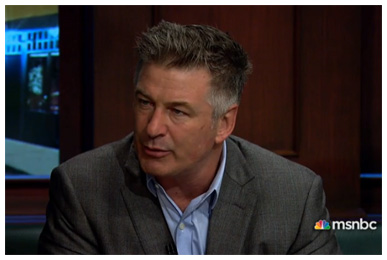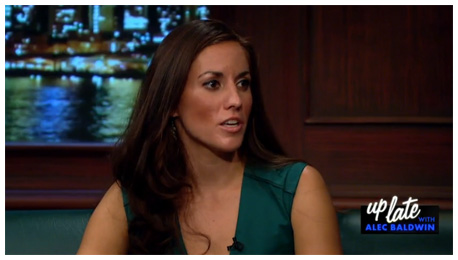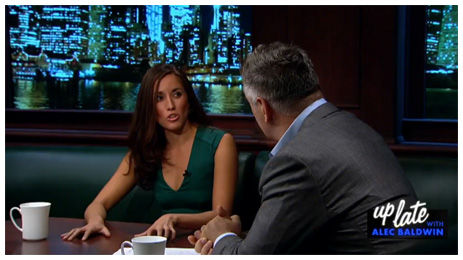 Cristina Tzintzún, the executive director and co-founder of Austin’s Workers Defense Project (WDP), was a guest last Friday on the MSNBC show Up Late with Alec Baldwin. As government leaders continue to argue about how to handle immigration reform, Baldwin sat down with Tzintzún to talk about the efforts of the WDP “to defend the rights of undocumented workers”, and why comprehensive immigration reform in the United States is crucial for the future of the construction industry. With 11 million undocumented immigrants living and working in the United States, their treatment from a humanitarian point of view is no small problem. Baldwin introduces the topic by explaining:
Cristina Tzintzún, the executive director and co-founder of Austin’s Workers Defense Project (WDP), was a guest last Friday on the MSNBC show Up Late with Alec Baldwin. As government leaders continue to argue about how to handle immigration reform, Baldwin sat down with Tzintzún to talk about the efforts of the WDP “to defend the rights of undocumented workers”, and why comprehensive immigration reform in the United States is crucial for the future of the construction industry. With 11 million undocumented immigrants living and working in the United States, their treatment from a humanitarian point of view is no small problem. Baldwin introduces the topic by explaining:
“While the battle over immigration reform plays out in Washington, out in the rest of the country, out of the spotlight, those undocumented workers are fighting real battles just to feed their families. Why? Because without the protection of citizenship, they are vulnerable to exploitation like wage theft – people hiring them to do work and then not paying them, in unsafe and even deadly work conditions. ... The Workers Defense Project in Texas is leading the fight to change this.” Cristina Tzintzún explained what types of help workers, both undocumented immigrants and legal citizens, receive from the Workers Defense Project. The WDP helps workers get the wages they are owed and receive medical care when they are injured on the job. In addition, the WDP is fighting to change the rules that “work against workers” which allow the workers to be abused and taken advantage of by unscrupulous employers who think that they don’t have to treat workers fairly, especially if they are undocumented. She explained:
Cristina Tzintzún explained what types of help workers, both undocumented immigrants and legal citizens, receive from the Workers Defense Project. The WDP helps workers get the wages they are owed and receive medical care when they are injured on the job. In addition, the WDP is fighting to change the rules that “work against workers” which allow the workers to be abused and taken advantage of by unscrupulous employers who think that they don’t have to treat workers fairly, especially if they are undocumented. She explained:
“The issues we were facing in Texas were with construction workers. In other parts of the country, those tend to be good, blue-collar jobs, but in Texas they weren’t. We were seeing workers die and be injured on the job and not get paid. Even though we were representing workers from all industries, about 80% of the people that came to us worked in construction – on small residential projects to large-scale commercial and even federal projects where this kind of abuse was happening.” She went on to say that she works with Republican business owners who are trying to run ethical, legal construction companies but are not able to find the legal workforce which they need because half of available construction workers in Texas are undocumented. She said that Texas construction companies who commit payroll fraud by paying workers “off the books” cost the federal government over one billion dollars each year in lost tax revenue – that is just from construction workers in Texas alone. “You can imagine nationally the amount of tax dollars we are losing because of our broken immigration system,” she said.
She went on to say that she works with Republican business owners who are trying to run ethical, legal construction companies but are not able to find the legal workforce which they need because half of available construction workers in Texas are undocumented. She said that Texas construction companies who commit payroll fraud by paying workers “off the books” cost the federal government over one billion dollars each year in lost tax revenue – that is just from construction workers in Texas alone. “You can imagine nationally the amount of tax dollars we are losing because of our broken immigration system,” she said.
Baldwin asked Tzintzún about a particular case in which WDP asked the city of Austin and computer giant Apple to embrace certain principles when hiring a workforce to build new office space in Texas. Apple was given 30 million dollars in local and state tax breaks as incentive to bring their business to Texas, so WDP challenged Apple and the City of Austin to ensure that the construction workers who were hired to build their new million-square-foot complex would:
- have workers’ compensation insurance,
- be given safety training, and
- be paid a fair wage.
Sound familiar? These are the very principles which the Construction Career Collaborative (C3) embodies and promotes to advance the commercial construction workforce. The C3 website lists the principles which C3 Accredited Employers are asked to adhere to:
- Participate in and support industry craft training programs, leading to portable credentials for the craft worker.
- All craft workers will complete established OSHA training as well as C3 5-Hour Safety Awareness Training.
- Provide worker security by payment of unemployment taxes; provide workers’ compensation insurance; contribute to social security.
- Pay by the hour with applicable overtime in lieu of piecework payment.
You can watch the first part of the interview in the following 13-minute video:
In the final 9 minutes of the interview, Tzintzún shares why she feels such a personal connection to her work with WDP. She says,
“People ask us ‘How have you done these things in Texas – it’s a very conservative state?’ More than anything, it has been the stories of our members. We feel like we have Truth on our side. Everyone in this country (for the most part, if they have a heart) believes that everyone should be paid for their work, believes that everyone should be treated safely on the job.”



Add new comment